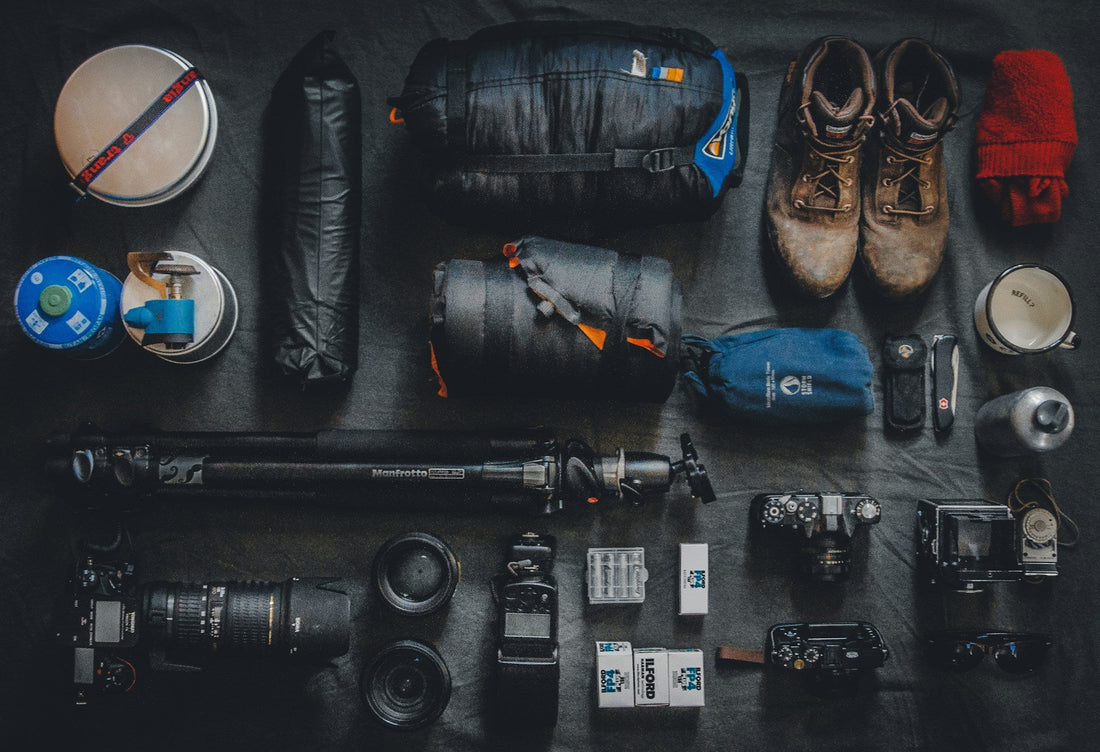
No More Camping Confusion: A Beginner's Glossary of Camping Terms
Share
Embarking on your first camping adventure can be an exciting yet daunting experience, especially when you're bombarded with a whole new vocabulary of terms and jargon. From "car camping" to "dispersed camping" and "bear bag" to "carabiner," the world of camping has its own unique language that can leave even the most seasoned outdoor enthusiasts scratching their heads.
Fear not, fellow campers! In this comprehensive camping glossary, we'll demystify the most common camping terms, ensuring you can navigate the great outdoors with confidence and ease. Whether you're planning a weekend getaway or a week-long wilderness expedition, this guide will equip you with the knowledge to make the most of your camping experience.
Basic Camping Gear Terms
Let's start with the essentials – the gear that makes camping possible. Understanding the components of your camping equipment will help you make informed decisions and ensure you have everything you need for a comfortable and safe trip.
Tent Components
- Fly/Rainfly: The outer, waterproof layer of a tent that provides protection from the elements.
- Vestibule: The covered area at the entrance of a tent, often used for storing gear or as an additional living space.
- Guy Lines: The adjustable cords that secure the tent to the ground, helping to stabilize the structure.
- Stake: The metal or plastic pegs used to secure the tent's guy lines and keep the structure in place.
Sleeping Equipment
- Sleeping Bag: An insulated, envelope-like piece of gear that keeps you warm while sleeping outdoors.
- Sleeping Pad: A foam or inflatable mat that provides cushioning and insulation between you and the ground.
- Hammock: A suspended, fabric sleeping system that allows you to sleep off the ground.
Cooking and Kitchen Gear
- Camp Stove: A portable, fuel-powered device used for cooking meals and boiling water while camping.
- Cookset: A nested set of pots, pans, and utensils designed for use in the outdoors.
- Cooler: An insulated container used to keep food and drinks cold during a camping trip.
Camping Types and Styles
Camping encompasses a wide range of experiences, from the luxurious to the rugged. Understanding the different types of camping can help you choose the right approach for your needs and preferences.
Car Camping
This style of camping involves driving your vehicle to a designated campsite and setting up your gear nearby. Car camping allows you to bring more equipment and supplies, making it a popular choice for families and those new to the outdoors.
Backcountry Camping
Also known as wilderness or remote camping, this involves hiking into more remote, undeveloped areas and setting up camp away from established campsites. Backcountry camping requires more self-reliance and specialized gear, but it offers a more immersive and secluded experience.
Dispersed Camping
This refers to camping in undeveloped, often free, areas outside of designated campgrounds. Dispersed camping allows for more solitude and a sense of adventure, but it also requires more planning and self-sufficiency.
Glamping
A portmanteau of "glamorous" and "camping," glamping combines the comforts of home with the beauty of the great outdoors. Glamping sites often feature luxurious amenities, such as plush bedding, private bathrooms, and gourmet meals.
Outdoor Navigation and Terrain Terms
Navigating the wilderness requires a basic understanding of the terrain and the tools used to find your way.
Campsite-Related Vocabulary
- Pitch: To set up a tent or other camping shelter.
- Campfire Ring: A designated, often stone-lined, area for building a campfire.
- Picnic Table: A sturdy, outdoor table often found in developed campsites.
Trail and Terrain Descriptions
- Switchback: A zig-zag trail that helps hikers ascend or descend steep terrain.
- Blaze: A painted mark on a tree or post that indicates the direction of a hiking trail.
- Treeline: The highest elevation at which trees can grow, often indicating the transition to alpine or tundra environments.
Basic Navigation Terms
- Compass: A tool that helps you determine cardinal directions and navigate through the wilderness.
- GPS: Global Positioning System, a satellite-based navigation technology that can pinpoint your location.
- Waypoint: A specific, marked location on a map or GPS device that serves as a reference point.
Camping Safety and Environment
Staying safe and respecting the natural environment are essential components of any successful camping trip.
Weather-Related Terminology
- Flash Flood: A sudden, intense flood caused by heavy rainfall, often in dry or mountainous areas.
- Wind Chill: The perceived decrease in air temperature due to the cooling effect of wind.
- Thunderstorm: A storm characterized by the presence of lightning and thunder, which can be dangerous for campers.
Wildlife and Nature Terms
- Bear Bag: A bag or container used to store food and other scented items, hung high from a tree to keep them away from bears and other wildlife.
- Leave No Trace: A set of principles that promote minimizing the impact of outdoor activities on the environment.
- Biodegradable: Capable of being broken down naturally by microorganisms, without leaving harmful residues.
Safety Equipment Vocabulary
- Headlamp: A hands-free light source worn on the head, useful for navigating in the dark.
- Whistle: A small, portable device used to signal for help or attract attention in an emergency.
- First Aid Kit: A collection of supplies and equipment for providing immediate medical care.
Miscellaneous Camping Jargon
Beyond the essential gear and terminology, there's a whole world of camping-related slang and expressions that can add color to your outdoor adventures.
Common Camping Slang
- Hiker Hunger: The increased appetite experienced by those engaging in strenuous outdoor activities.
- Hangry: A combination of "hungry" and "angry," describing the irritable state that can result from not eating enough.
- Trail Magic: Unexpected acts of kindness or generosity encountered by hikers and campers.
Useful Outdoor Expressions
- Bug Out: To quickly and abruptly leave a campsite or situation, often due to an emergency or unpleasant conditions.
- Shakedown: A thorough inspection and organization of camping gear before a trip, ensuring everything is in working order.
- Hiker's High: The euphoric feeling experienced by outdoor enthusiasts, often attributed to the release of endorphins during physical activity.
Communication Terms
- Trailhead: The starting point of a hiking trail, where campers and hikers often gather or meet.
- Basecamp: The main campsite from which explorers and hikers depart for day trips or longer excursions.
- Resupply: The act of replenishing food, water, or other essential supplies during a camping or hiking trip.
By familiarizing yourself with this comprehensive camping glossary, you'll be well on your way to navigating the great outdoors with confidence and ease. Whether you're planning a weekend getaway or a week-long wilderness adventure, understanding the language of camping will help you make the most of your time in nature. So, grab your gear, lace up your boots, and get ready to explore the wonders of the great outdoors!
